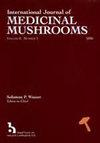Addition of Mucoadhesive Agent to Enzymatically Polymerized Caffeic Acid-Based Nasal Vaccine Formulation Attenuates Antigen-Specific Antibody Responses in Mice
IF 1.4
4区 生物学
Q4 MYCOLOGY
International journal of medicinal mushrooms
Pub Date : 2024-06-01
DOI:10.1615/intjmedmushrooms.2024054586
引用次数: 0
Abstract
Mucosal vaccination is a promising strategy for combating infectious diseases caused by pathogenic microbes, as it can generate antigen-specific immune responses in both systemic and mucosal compartments. In our recent study, we developed a nasal vaccine system for Streptococcus pneumoniae infections in mice using enzymatically polymerized polyphenols such as caffeic acid. However, the efficacy of this mucosal vaccine system is approximately 70%, indicating a need for improvement. To address this issue, we hypothesized that incorporating a mucoadhesive agent that enhances mucosal absorption into a polyphenol-based mucosal vaccine system would improve vaccine efficacy. Contrary to our expectations, we found that adding a mucoadhesive agent, hydrophobically modified hydroxypropylmethylcellulose (HM-HPMC), to the vaccine system reduced the stimulation of antigen-specific antibody responses in both the mucosal (more than 90% reduction; p < 0.05) and systemic compartments (more than 80% reduction; p < 0.05). Although the addition of the mucoadhesive agent may have interfered with the interaction between the mucosal epithelium and the vaccine system, the underlying mechanism remains unclear, and further research is needed to fully understand the mechanisms involved.在基于咖啡酸的酶法聚合鼻腔疫苗制剂中添加黏附剂可减轻小鼠的抗原特异性抗体反应
粘膜疫苗接种可在全身和粘膜两部分产生抗原特异性免疫反应,因此是抗击病原微生物引起的传染性疾病的一种很有前景的策略。在我们最近的研究中,我们利用酶聚合多酚(如咖啡酸)开发了一种鼻腔疫苗系统,用于治疗小鼠肺炎链球菌感染。然而,这种粘膜疫苗系统的效力约为 70%,表明需要改进。为了解决这个问题,我们假设在基于多酚的粘膜疫苗系统中加入一种能促进粘膜吸收的粘附剂将会提高疫苗的效力。与我们的预期相反,我们发现,在疫苗系统中添加粘附剂--疏水改性羟丙基甲基纤维素(HM-HPMC)--会降低对粘膜(降低 90% 以上;p <0.05)和全身(降低 80% 以上;p <0.05)中抗原特异性抗体反应的刺激。虽然添加粘液粘附剂可能干扰了粘膜上皮与疫苗系统之间的相互作用,但其根本机制仍不清楚,需要进一步研究才能充分了解其中的机制。
本文章由计算机程序翻译,如有差异,请以英文原文为准。
求助全文
约1分钟内获得全文
求助全文
来源期刊
CiteScore
2.60
自引率
16.70%
发文量
91
审稿时长
6-12 weeks
期刊介绍:
The rapid growth of interest in medicinal mushrooms research is matched by the large number of disparate groups that currently publish in a wide range of publications. The International Journal of Medicinal Mushrooms is the one source of information that will draw together all aspects of this exciting and expanding field - a source that will keep you up to date with the latest issues and practice. The International Journal of Medicinal Mushrooms published original research articles and critical reviews on a broad range of subjects pertaining to medicinal mushrooms, including systematics, nomenclature, taxonomy, morphology, medicinal value, biotechnology, and much more.

 求助内容:
求助内容: 应助结果提醒方式:
应助结果提醒方式:


